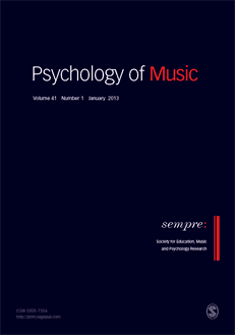
Psychology of Music
Scope & Guideline
Fostering Connections Through Music and Mind
Introduction
Aims and Scopes
- Music and Emotion:
Research focusing on how music elicits and regulates emotions, exploring the psychological mechanisms behind emotional responses to music. - Music and Identity:
Studies examining how musical engagement contributes to identity formation and maintenance, particularly in different cultural and social contexts. - Music in Education:
Investigations into the pedagogical practices and psychological impacts of music education, including student motivation, learning strategies, and emotional well-being. - Music Therapy and Health:
Research on the therapeutic applications of music, including its effects on mental health, emotional regulation, and overall well-being. - Cognitive and Perceptual Processes in Music:
Exploration of how individuals perceive, interpret, and cognitively process music, including studies on musical memory, attention, and expertise. - Social and Cultural Dimensions of Music:
Studies examining the role of music in social interactions and cultural practices, including music's influence on group identity and social cohesion.
Trending and Emerging
- Music and Mental Health:
An increasing number of studies explore the therapeutic benefits of music on mental health, particularly in the context of stress, anxiety, and depression, highlighting music's role in emotional regulation. - Digital Music Engagement:
Research on how digital platforms and social media impact music consumption and engagement is on the rise, reflecting changes in how individuals interact with music in a digital age. - Interdisciplinary Approaches:
There is a growing trend toward interdisciplinary research that combines music psychology with fields such as neuroscience, education, and social sciences, enhancing the understanding of music's multifaceted impacts. - Cultural and Social Empowerment through Music:
Studies focusing on the role of music in cultural identity, social movements, and empowerment, particularly among marginalized groups, are increasingly prevalent. - Music and Youth Development:
Emerging research is focusing on the impact of music on youth development, particularly concerning social skills, emotional intelligence, and community engagement.
Declining or Waning
- Traditional Music Education Methods:
Research focusing solely on traditional pedagogical approaches to music education is becoming less prevalent, as there is a shift towards more innovative and interdisciplinary methods. - Music and Gender Stereotypes:
While previously a significant area of study, investigations specifically centered on gender stereotypes in music are appearing less frequently, possibly due to a broader focus on intersectionality. - Classical Music Focus:
There is a noticeable decline in studies exclusively examining classical music, as interest shifts towards popular and contemporary music forms and their psychological implications. - Music Performance Anxiety in Isolation:
Research concentrating solely on music performance anxiety without considering related factors such as social support and coping strategies is becoming less common, reflecting a more integrated approach to understanding this phenomenon.
Similar Journals
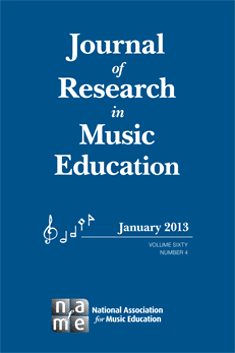
JOURNAL OF RESEARCH IN MUSIC EDUCATION
Pioneering Research for Tomorrow's Music EducatorsThe JOURNAL OF RESEARCH IN MUSIC EDUCATION, published by SAGE PUBLICATIONS INC, is a leading academic outlet in the field of music education, dedicated to advancing the study and understanding of music teaching and learning. With an impressive impact factor and classified in the Q1 category for both Education and Music, this journal plays a critical role in disseminating innovative research and insights that foster effective educational practices. Since its inception in 1953, it has maintained a rigorous peer-review process, contributing to its strong reputation within the academic community, as evidenced by its high rankings in Scopus. The journal's focus spans a wide range of topics, including pedagogical strategies, curriculum development, and the intersection of music and education policy, making it an essential resource for researchers, educators, and students alike. As it continues to evolve, users can explore a treasure trove of knowledge that supports the transformative power of music education in the 21st century.
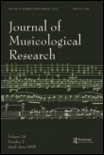
JOURNAL OF MUSICOLOGICAL RESEARCH
Exploring the Depths of Musical ScholarshipJOURNAL OF MUSICOLOGICAL RESEARCH, published by Taylor & Francis Ltd, is an esteemed platform that delves into the field of musicology, contributing to the ongoing dialogue in music research and scholarship since its establishment in 1979. With an ISSN of 0141-1896 and an E-ISSN of 1547-7304, this journal serves as a vital resource for researchers, professionals, and students, offering insights into diverse musicological topics. Although currently categorized in Q4 in Music with Scopus rankings placing it at #110 out of 180 in the Arts and Humanities field, its commitment to excellence and broader discourses in music studies is evident. The journal does not have Open Access options, yet it provides accessible content through reputable academic channels, fostering scholarly exchanges within the community. It aims to publish high-quality research that advances understanding of musical practices and cultural implications, making it a critical resource for those passionate about music and its myriad influences.

BULLETIN OF THE COUNCIL FOR RESEARCH IN MUSIC EDUCATION
Empowering Educators with Critical InsightsBULLETIN OF THE COUNCIL FOR RESEARCH IN MUSIC EDUCATION, published by UNIV ILLINOIS PRESS, is a premier scholarly journal dedicated to advancing the field of music education through rigorous research and critical discourse. With an ISSN of 0010-9894 and E-ISSN 2162-7223, this journal plays a significant role in disseminating innovative findings and educational practices, ranking in Q1 for Music and Q2 for Education as of 2023. The journal's esteemed position is further highlighted by its Scopus ranking, placing it in the 80th percentile among music-related publications. Covering a time span from 2002 to 2024, it serves as a vital resource for educators, researchers, and graduate students alike. Although the journal does not currently offer open access, its contributions remain crucial in shaping music education research and practice. The BULLETIN not only inspires scholarly inquiry but also enhances the discourse surrounding effective music education methodologies.

Information and Communication Technology in Musical Field
Unveiling the Tech-Driven Evolution of Musical ExpressionInformation and Communication Technology in Musical Field is an esteemed academic journal published by MEDIA MUSICA, dedicated to exploring the intersections of technology and music. With an ISSN of 2067-9408 and an E-ISSN of 2069-654X, this journal serves as a vital resource for researchers, professionals, and students interested in the latest advancements and applications of information and communication technologies within the musical sphere. While specific impact factor metrics are currently unavailable, the journal aims to provide a platform for high-quality research that fosters innovation in music production, distribution, and theory. The implications of technology in music are profound, influencing everything from composition to performance and consumption, and this journal strives to illuminate these transformative changes. Located in Cluj-Napoca, Romania, at STR ICBRATIANU NR 25, this publication encourages submissions that contribute to the diverse dialogue surrounding music and technology, ensuring that it remains an essential reference for those at the forefront of this dynamic field.
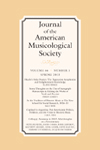
JOURNAL OF THE AMERICAN MUSICOLOGICAL SOCIETY
Pioneering insights in the art of music.JOURNAL OF THE AMERICAN MUSICOLOGICAL SOCIETY, published by University of California Press, is a prestigious peer-reviewed journal dedicated to advancing the field of musicology. With an ISSN of 0003-0139 and E-ISSN 1547-3848, this journal has been a cornerstone of scholarly communication since its inception in 1970 and continues to be relevant through 2024. Its esteemed standing is reflected in its Q2 ranking in the Music category and a respectable 71/180 ranking in the Arts and Humanities discipline, placing it in the 60th percentile among its peers. The journal provides an essential platform for researchers, professionals, and students to explore diverse topics in musicology, ranging from historical studies to contemporary analyses. While it does not currently offer Open Access options, its rigorous editorial standards ensure the publication of high-quality research that contributes significantly to the academic dialogue in music studies. With its address based in the United States at 155 Grand Ave, Suite 400, Oakland, CA 94612-3758, the journal remains a vital resource for those seeking to deepen their understanding of the complexities of music and its societal impacts.

Muzikoloski Zbornik
Advancing the Boundaries of MusicologyMuzikoloski Zbornik is a prominent open-access journal in the field of musicology, published by the esteemed University of Ljubljana Press since 1965. Hailing from Slovenia, this journal has been dedicated to advancing the study of musical heritage, theory, and practice, serving as a vital platform for researchers, professionals, and students alike. With a notable Q2 category ranking in the field of music and a Scopus ranking of 109 out of 180 in Arts and Humanities, Muzikoloski Zbornik showcases high-quality research, fostering discourse and collaboration among scholars globally. The journal embraces a diverse range of topics, from ethnomusicology to music education, ensuring its relevance in an ever-evolving academic landscape. By providing unrestricted access to its content, it champions the dissemination of knowledge and supports the growth of the musicology discipline.
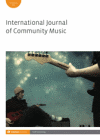
International Journal of Community Music
Innovating Research for a Harmonious TomorrowThe International Journal of Community Music, published by INTELLECT LTD, stands at the forefront of interdisciplinary research in the field of community music. With an ISSN of 1752-6299 and an E-ISSN of 1752-6302, this esteemed journal has made significant contributions to the understanding of music as a vehicle for social inclusion, cultural expression, and community building since its inception in 2008. Operating from the United Kingdom, the journal is well-regarded within the academic community, boasting a Q1 ranking in Music and a commendable 85th percentile position in the Scopus Arts and Humanities category. The journal provides a platform for innovative research, case studies, and critical discussions that explore the dynamic relationships between music and community engagement. With a focus on fostering new knowledge and practices, the International Journal of Community Music serves as an essential resource for researchers, practitioners, and students who are passionate about the transformative power of music in society.

Opus
Unveiling the Dimensions of Musical DiscourseOpus is an esteemed open-access journal published by the Associação Nacional de Pesquisa e Pós-Graduação em Música in Brazil, focusing on the field of music studies. With an ISSN of 1517-7017, Opus has been dedicated to fostering innovative research since its inception and has embraced the open-access model since 2009, ensuring that its findings are readily accessible to scholars and enthusiasts globally. The journal has achieved a commendable Q2 ranking in Music as of 2023, showcasing its impact and relevance within the arts and humanities. Although currently ranked #130 out of 180 in Scopus in the music category, Opus maintains a commitment to enhancing the scholarly discourse in musicology through empirical studies, theoretical analyses, and interdisciplinary approaches. The journal's convergence over the years, from 2017 to 2024, reflects its dedication to evolving educational and research methodologies in music. Situated in the vibrant academic landscape of Campinas, SP, Brazil, Opus invites researchers, professionals, and students to contribute to its mission of exploring the multifaceted dimensions of music.
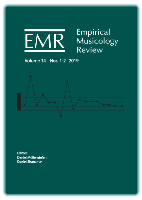
Empirical Musicology Review
Bridging Theory and Practice: Where Musicology Meets MethodologyEmpirical Musicology Review is a pioneering journal in the field of musicology, published by the Ohio State University School of Music. Established as an open access journal since 2006, it aims to foster interdisciplinary research by providing a platform for scholars to disseminate empirical studies and analyses related to music. With ISSN 1559-5749, this journal plays a crucial role in expanding the understanding of music through methodological rigor and innovative practices, catering to researchers, professionals, and students alike. By promoting the accessibility of high-quality research, Empirical Musicology Review significantly contributes to the evolving landscape of music studies and enhances the global dialogue surrounding music's theoretical and practical dimensions. The journal's commitment to open access ensures that its valuable insights reach a broad audience, encouraging further exploration and collaboration within the musicology community.

Malaysian Journal of Music
Diving Deep into the Heart of Malaysian MusicThe Malaysian Journal of Music is a distinguished academic publication dedicated to the exploration and advancement of music and cultural studies within the Southeast Asian context. Published by UNIV PENDIDIKAN SULTAN IDRIS, FACULTY OF MUSIC & PERFORMING ARTS, this journal contributes significantly to the field by disseminating high-quality research and scholarship related to both traditional and contemporary music practices in Malaysia and beyond. Since its inception in 2018, the journal has earned a Q3 categorization in both Cultural Studies and Music, reflecting its commitment to fostering a comprehensive understanding of these interdisciplinary areas. As of now, it ranks 90th out of 180 in the domain of Arts and Humanities focused on Music, positioning it firmly within the academic discourse. The Malaysian Journal of Music serves as an invaluable resource for researchers, professionals, and students alike, providing insights into the rich tapestry of music, culture, and their societal impacts. The journal is dedicated to open access publishing, ensuring that knowledge is shared widely and freely, further solidifying its role as a cornerstone for music scholarship in Malaysia.